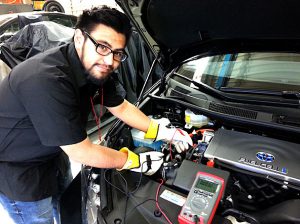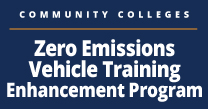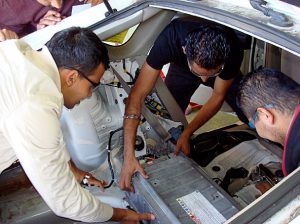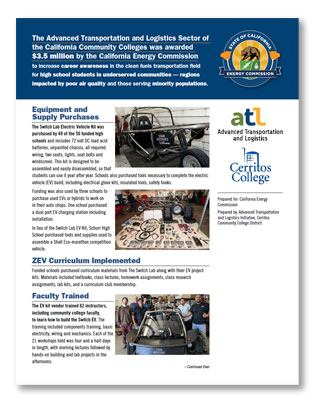
 In addition to using California Energy Commission funding for equipment purchases and faculty training, colleges funded through the Community College Alternative Fuel and Vehicle Technology Training Enhancement Program developed and modified curriculum in an effort to improve their existing programs and better prepare students for jobs in this growing field. Some of these new and improved courses are already being offered, and others are set to roll out this spring.
In addition to using California Energy Commission funding for equipment purchases and faculty training, colleges funded through the Community College Alternative Fuel and Vehicle Technology Training Enhancement Program developed and modified curriculum in an effort to improve their existing programs and better prepare students for jobs in this growing field. Some of these new and improved courses are already being offered, and others are set to roll out this spring.
New Classes Created
 Several new classes were developed with Energy Commission funding. College of the Desert, De Anza College and Cerritos College created courses focused on Compressed Natural Gas while Copper Mountain College and Hartnell College developed curriculum for hybrid/electric vehicle courses.
Several new classes were developed with Energy Commission funding. College of the Desert, De Anza College and Cerritos College created courses focused on Compressed Natural Gas while Copper Mountain College and Hartnell College developed curriculum for hybrid/electric vehicle courses.
In Orange County, Saddleback College will offer courses in Electric Vehicle service, maintenance, repair and diagnosis.
Victor Valley College created an Alternative Propulsion series of classes consisting of the following:
- Introduction to Hybrid, Electric Vehicle, and Alternative Propulsion Vehicle Technology
- Hybrid Vehicle Propulsion
- Electric Vehicle & Alternative Propulsion
- Advanced Hybrid, Electric Vehicle, and Alternative Propulsion Technology
Faculty at each campus took on the task of developing student learning outcomes, course syllabi, PowerPoint lecture presentations, lab activities, and identified appropriate textbooks and materials.
Classes Modified and Updated
 To keep up with advancements in automotive alternative fuel systems, it’s necessary for colleges to modify and update their courses to include the most current technologies. Curriculum updates at Chabot College provide students with a more in-depth look at AFV relevant topics, such as charging, battery technology, electrical generation and fuel cell vehicles. Core automotive courses now also include hybrid and electric vehicle “awareness” instruction that will benefit students as they progress through the program.
To keep up with advancements in automotive alternative fuel systems, it’s necessary for colleges to modify and update their courses to include the most current technologies. Curriculum updates at Chabot College provide students with a more in-depth look at AFV relevant topics, such as charging, battery technology, electrical generation and fuel cell vehicles. Core automotive courses now also include hybrid and electric vehicle “awareness” instruction that will benefit students as they progress through the program.
Cerritos College added a laboratory component to its Introduction to Alternative Fuels course in order to give students a practical, hands-on understanding of concepts presented.
It was also necessary for colleges to integrate new equipment purchased into course curriculum. Bakersfield College accomplished this and also built lab exercises with the newly purchased tools to match the training curriculum.
“The scan tools, software subscriptions and smog machine are now part of everyday class activities at Bakersfield College and have enhanced our entire program courses offerings,” said Andrew Haney, Automotive Instructor at Bakersfield College.
New Certificates and Degree Programs
 American River College modified its existing alternative fuels and green vehicle technology certificate to a more comprehensive certificate which includes classes in electric vehicle construction diagnosis and repair as well as introductory and advanced hybrid and electric vehicle technology courses. This new certificate proposal removes the hidden prerequisites in the previous certificates and includes all courses that contain need-to-know information to service and repair alternative fuel vehicles.
American River College modified its existing alternative fuels and green vehicle technology certificate to a more comprehensive certificate which includes classes in electric vehicle construction diagnosis and repair as well as introductory and advanced hybrid and electric vehicle technology courses. This new certificate proposal removes the hidden prerequisites in the previous certificates and includes all courses that contain need-to-know information to service and repair alternative fuel vehicles.
In the Bay Area, De Anza College initiated the curriculum process for an Alternative Fuels advanced certificate and degree tract.
Curriculum Materials Available
Links to the curriculum materials developed with the Energy Commission funding are now available. Click here to view and download.



